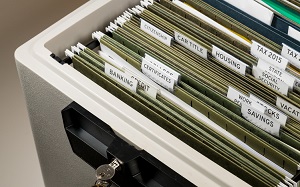 As a professional organizer I’m frequently asked about how long to keep important papers. There is no catch-all answer to this question. The IRS states – The length of time you should keep a document depends on the action, expense, or event which the document records. There is a different answer for each document. Some need to be kept forever and others have a life cycle.
As a professional organizer I’m frequently asked about how long to keep important papers. There is no catch-all answer to this question. The IRS states – The length of time you should keep a document depends on the action, expense, or event which the document records. There is a different answer for each document. Some need to be kept forever and others have a life cycle.
Going back to the basics for a moment, important papers are documents that include your personal information. They are considered legal documents. Some documents contain your social security number, others contain account numbers and other personal information. They have information on them that could cause great harm to you if they fall into the hands of an identity thief and must be protected.
Another thing to consider, is that no one will tell you exactly how long you have to keep important papers. They typically provide guidelines, not hard and fast requirements.
When I went to the internet to do some research on this subject, many people or organizations have information on record retention. There were similarities, and some were the same in terms of frequency of how long to keep important papers. Some had differing thoughts as to how long to keep the same documents.
Most of what I read on the subject of document retention, seemed to go back to keeping them for tax purposes. Either in the current year or down the road if you were to get audited. This post is sort of a consolidation of what I read from the three sources below, and a few I threw into the mix.
Dave Ramsey – Organizing Your Important Documents
IRS – How Long Should I Keep Records?
Keep for 1 – 3 months:
- ATM printouts & bank deposit slips (discard after you balance your checkbook)
- Sales receipts for minor purchases
Keep for 1 year:
- Paycheck stubs (discard after comparing to your annual W2 or social security statement)
- Utility bills (unless you use them as a tax deduction, then keep them for 3 years after you file your tax return)
- Cancelled checks (unless you need them for tax purposes, then keep them for 3 years after you file your tax return)
- Credit card receipts (unless you need them for tax purposes, then keep them for 3 years after you file your tax return)
- Bank statements (unless you need them for tax purposes, then keep them for 3 years after you file your tax return)
- Quarterly investment statements (keep until you receive your annual statement)
Keep for 3 years:
- Income tax returns (see above link to IRS for limitations that apply to income tax returns)
- Medical bills
- Cancelled insurance policies
- Records of selling a house (documentation for capital gains tax)
- Records of selling a stock (documentation for capital gains tax)
- Documents that support income or a deduction on your tax return
- Annual investment statement (keep for 3 years after you sell the investment)
Keep for 7 years:
- Records of satisfied loans
Keep until expiration:
- Warranties (unless user manual is attached then keep for the life of the item)
- Automobile insurance cards (proof of insurance)
- Automobile insurance policies (unless a claim/lawsuit is pending; also if you change companies & get a new policy)
- Sales receipts (unless needed for tax purposes then keep for 3 years)
- Drivers license
Keep while active:
- Contracts
- Stock certificates/bonds
- Property records
- Property tax records for disputed bills (keep until the dispute is resolved)
- Home improvement records (keep until this house is sold)
- Home maintenance records (keep until this house is sold)
- Pet medical records (keep until you no longer have this pet)
Forever:
- Birth certificates
- Death certificates
- Passports
- Marriage licenses
- Adoption papers
- Estate documents (trusts, wills, power of attorney designations, health care directives, etc.)
- Deeds
- Records of paid mortgages
- Records of lawsuits
- Medical records
- Disability records
- Education records
- Military records


